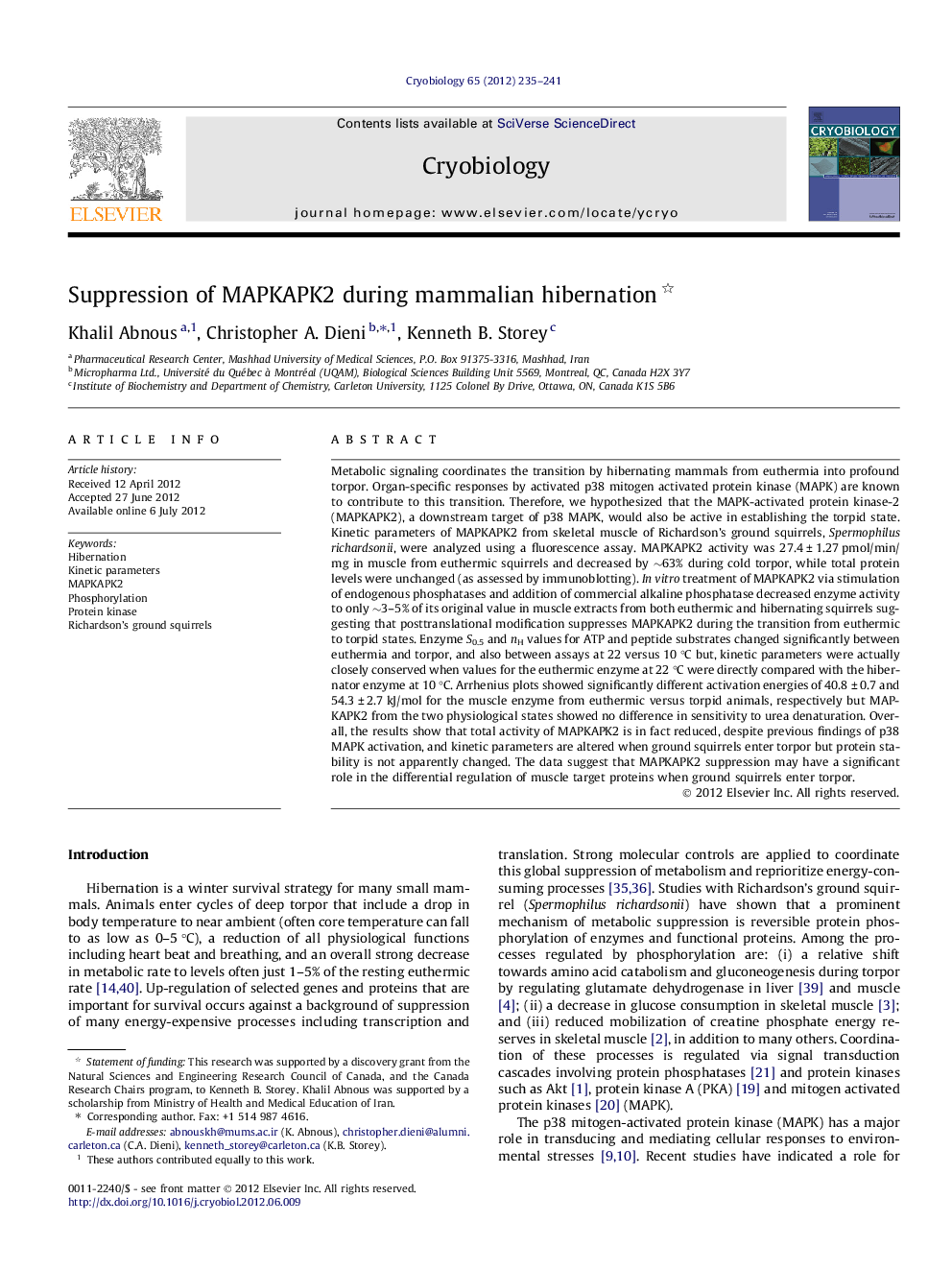| کد مقاله | کد نشریه | سال انتشار | مقاله انگلیسی | نسخه تمام متن |
|---|---|---|---|---|
| 10928487 | 1092904 | 2012 | 7 صفحه PDF | دانلود رایگان |
عنوان انگلیسی مقاله ISI
Suppression of MAPKAPK2 during mammalian hibernation
دانلود مقاله + سفارش ترجمه
دانلود مقاله ISI انگلیسی
رایگان برای ایرانیان
کلمات کلیدی
موضوعات مرتبط
علوم زیستی و بیوفناوری
علوم کشاورزی و بیولوژیک
علوم کشاورزی و بیولوژیک (عمومی)
پیش نمایش صفحه اول مقاله

چکیده انگلیسی
Metabolic signaling coordinates the transition by hibernating mammals from euthermia into profound torpor. Organ-specific responses by activated p38 mitogen activated protein kinase (MAPK) are known to contribute to this transition. Therefore, we hypothesized that the MAPK-activated protein kinase-2 (MAPKAPK2), a downstream target of p38 MAPK, would also be active in establishing the torpid state. Kinetic parameters of MAPKAPK2 from skeletal muscle of Richardson's ground squirrels, Spermophilus richardsonii, were analyzed using a fluorescence assay. MAPKAPK2 activity was 27.4 ± 1.27 pmol/min/mg in muscle from euthermic squirrels and decreased by â¼63% during cold torpor, while total protein levels were unchanged (as assessed by immunoblotting). In vitro treatment of MAPKAPK2 via stimulation of endogenous phosphatases and addition of commercial alkaline phosphatase decreased enzyme activity to only â¼3-5% of its original value in muscle extracts from both euthermic and hibernating squirrels suggesting that posttranslational modification suppresses MAPKAPK2 during the transition from euthermic to torpid states. Enzyme S0.5 and nH values for ATP and peptide substrates changed significantly between euthermia and torpor, and also between assays at 22 versus 10 °C but, kinetic parameters were actually closely conserved when values for the euthermic enzyme at 22 °C were directly compared with the hibernator enzyme at 10 °C. Arrhenius plots showed significantly different activation energies of 40.8 ± 0.7 and 54.3 ± 2.7 kJ/mol for the muscle enzyme from euthermic versus torpid animals, respectively but MAPKAPK2 from the two physiological states showed no difference in sensitivity to urea denaturation. Overall, the results show that total activity of MAPKAPK2 is in fact reduced, despite previous findings of p38 MAPK activation, and kinetic parameters are altered when ground squirrels enter torpor but protein stability is not apparently changed. The data suggest that MAPKAPK2 suppression may have a significant role in the differential regulation of muscle target proteins when ground squirrels enter torpor.
ناشر
Database: Elsevier - ScienceDirect (ساینس دایرکت)
Journal: Cryobiology - Volume 65, Issue 3, December 2012, Pages 235-241
Journal: Cryobiology - Volume 65, Issue 3, December 2012, Pages 235-241
نویسندگان
Khalil Abnous, Christopher A. Dieni, Kenneth B. Storey,